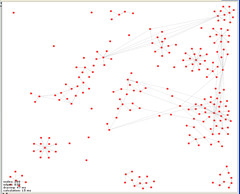I have a distinct tendency to see everything through the lens of what it means for research communities. I have just finally read Danah Boyd’s *It’s Complicated* a book that focuses on how and why U.S. teenagers interact with and through social media.
Messaggi di Rogue Scholar

Github for science sounds like a great plan? But do we have the underlying stack of equivalent services needed to provide “http for science” and “tcp/ip” for science. I argue that until we do we will struggle to really deliver on the excitement that examples (rightly) inspire.

The rationale behind open approaches is the way it enables you to make unexpected connections and to find otherwise hidden shortcuts. People, data, code, and expertise can be more effectively connected when the information is out there and discoverable. Here I wanted to document a little collaboration that was sparked on twitter and carried through using an entirely open toolset.

If you’ve been around either myself or Deepak Singh you will almost certainly have heard the Jeff Jonas/Jon Udell soundbite: ‘Data finds data. Then people find people’. The naïve analysis of the success of consumer social networks and the weaknesses of science communication has lead to efforts that almost precisely invert the Jonas/Udell concept.

A number of things recently have lead me to reflect on the nature of interactions between social media, research organisations and the wider community. What the first decade of the social web has taught us is that organisations that effectively harness the goodwill of their staff or members using social media tools do well. This approach is antithetical to traditional command and control management structures.

Image by cameronneylon via Flickr This post, while only 48 hours old is somewhat outdated by these two Friendfeed discussions. This was written independently of those discussions so it seemed worth putting out in its original form rather than spending too much time rewriting. I wrote recently about Sciencefeed, a Friendfeed like system aimed at scientists and was fairly critical.

I have long been an advocate of Friendfeed as a great tool for researchers. Here I discuss the new Friendfeed clone built for researchers, ScienceFeed, suggest what it is good for and what its weaknesses are.
Nat Torkington, picking up on my post over the weekend about the CRU emails takes a slant which has helped me figure out how to write this post which I was struggling with. He says: As I responded over at Radar, yes I am absolutely calling for social software for scientists, but I didn’t mean to say that we could expect it to help us find the visionaries amongst the simply wrong. But this raises a very helpful question.
I’ve avoided writing about the Climate Research Unit emails leak for a number of reasons. Firstly it is clearly a sensitive issue with personal ramifications for some and for many others just a very highly charged issue. Probably more importantly I simply haven’t had the time or energy to look into the documents myself. I haven’t, as it were, examined the raw data for myself, only other people’s interpretations.
…is that someone needs to make money out of them. It was inevitable at some point that Friendfeed would take a route that lead it towards mass adoption and away from the needs of the (rather small) community of researchers that have found a niche that works well for them.